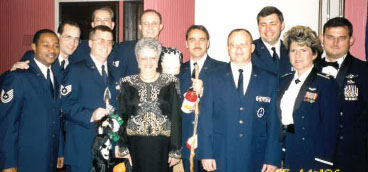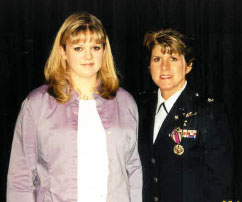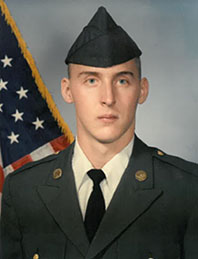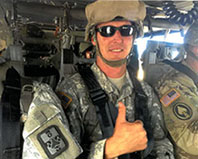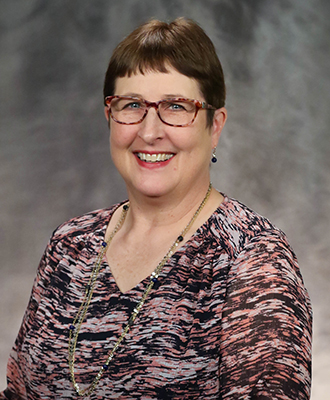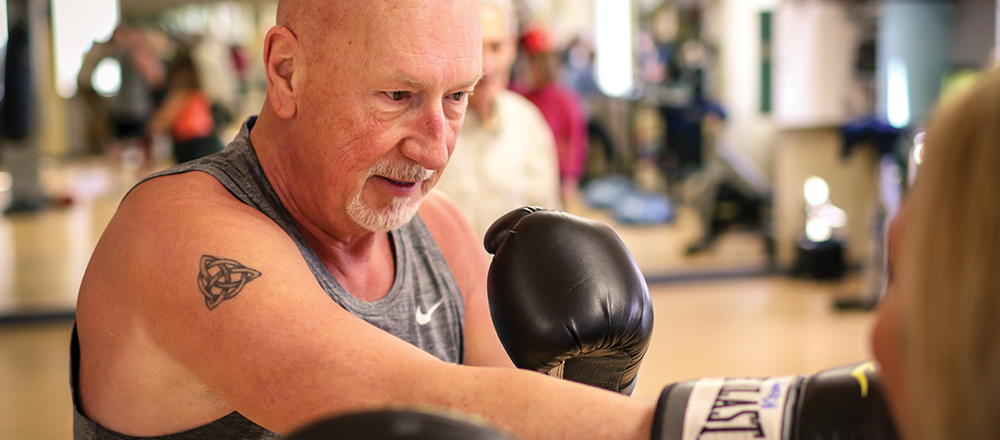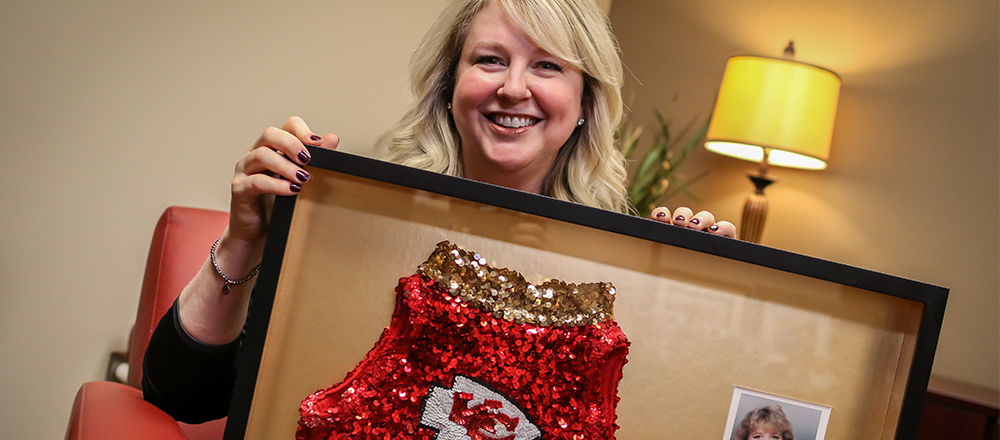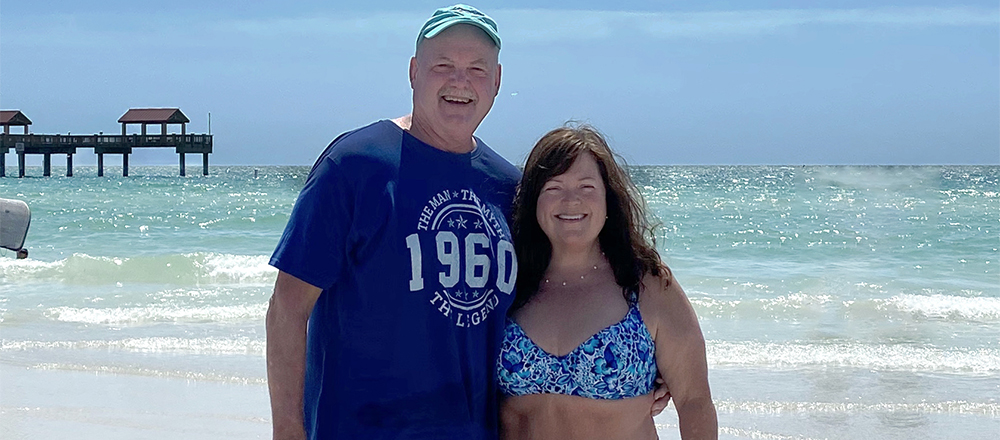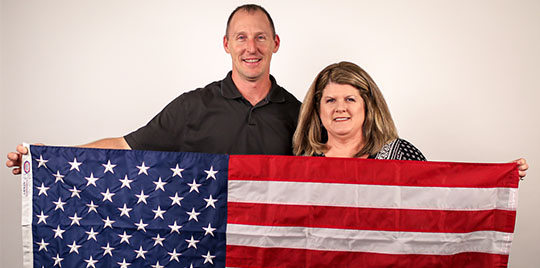
They were just 18 and 21 when they made one of the biggest decisions of their lives. A decision that took them to the most dangerous locations in the world, while taking them farther away from the most important people in their lives. As Veterans Day approaches on November 11, it’s more than discounts, free meals or a day off. It’s a time to remember the sacrifices made by the men and women who enlisted in the Armed Forces. People like NKCH employees Nurse Educator Joni Graff, DHED, MSN, and Trauma Program Manager Ray Staggs, RN, TCRN.
A Different Kind of Soldier
With her blonde hair and uniform skirt, Clinical Educator Joni Graff didn’t fit the stereotype of an Air Force officer. She often found herself outnumbered by her male counterparts. Only 7% of women served in the Air Force in the 1980s. Despite those odds, Joni climbed the Air Force ladder and retired in 2001 as a lieutenant colonel.
In 1980, Joni received a direct commission into the Air Force at age 21. With a husband in the military and tuition reimbursement to complete her BSN, Joni signed up. A three-year commitment turned into 21, as she experienced an environment and advancement opportunities beyond her expectations.
“I loved the camaraderie and the structure, and I met so many nice people,” she said. “I also liked preparing and practicing in the field for when we might be called to war.”
That day came in 1991 when Joni was deployed to Desert Storm for two months, her longest deployment, as the U.S. defended Saudi Arabia from Iraqi attack.
She helped set up a contingency hospital for wounded soldiers whose stable conditions allowed them to wait for transport to U.S. medical facilities. Before transfer, the medical team often performed minor surgeries, such as appendectomies, or repaired broken bones.
Veterans Day Thoughts
“I think of those who gave their lives for our country, especially my great uncle, Private Richard Bayha, killed in action in World War I at age 20.” ~ Joni
Much of Joni’s career focused on opening these contingency hospitals, from just an empty building to a full service hospital in just hours.
One of her proudest military accomplishments involved her service as a deputy commander overseeing the 55th Medical Operations Squadron, a group of 600 military personnel and civilians working inpatient, emergency and multiple medical clinics. “I am grateful to the military for providing this unique opportunity, which gave me with experience from different aspects of patient care,” Joni explained.
In one of the hardest decisions of her career, Joni declined the prestigious Air War College for senior professional military education, to take the deputy commander position.
For all of Joni’s accomplishments, like any military parent, she still remembers her family’s sacrifices. As a single mother, she left her daughter, Kristin, with her parents when she was deployed. It’s also when her grandmother died, and she was unable to attend the funeral. While away at training, Kristin developed chickenpox, but Joni could only stay one day before returning to duty.
At the end of her career, Joni recruited for a seven state area where she shared her love of the Air Force with other young people. Her Air Force experience is one she will forever treasure.
Now, Joni is molding young minds as an NKCH educator. She works with nursing schools to place students in clinical areas. It’s a job she’s held for over 16 years. She recently added a new accomplishment to her lengthy resume. She obtained her doctorate in health education, which she started in 2009. “We need more nurses with advanced degrees and more in academia,” Joni said. “Higher levels of education mean better outcomes and higher quality of patient care.”
A Passion to Serve
In 1991, Ray Staggs joined the Army at age 18. “Boot camp is one of the best things I ever did because it gave me courage and discipline,” Ray said. He’s still serving 26 years later and has relied on that courage to travel to war zones around the world.
His career started on the front lines in a field artillery unit. An interest in the medical field led him to become a combat medic and then obtain his LPN and RN degrees.
Ray was deployed from 2007-2008 during Operation Iraqi Freedom with the 325th Combat Support Hospital. He cared for the wounded in Tikrit, Iraq, and Balad, Iraq, at a facility that boasted a 98% survival rate.
During his deployments, Ray saw horrific injuries suffered by soldiers and civilians from gunshot wounds to burns. “It’s amazing what people can survive with highly skilled trauma teams and the proper care on the front line,” Ray said. “It’s similar to civilian practice where you need to stop the bleeding and transport to a hospital.”
Not everyone returned home. Ray remembers the emotions of military surgeons, emergency providers, nurses and other staff. “You are there with the wounded and the dying. They are our brothers and sisters. We are their family,” Ray said emotionally.
Ray credits military techniques with saving civilian patients today. Surgical procedures, tourniquets and combat gauze can stop the bleeding and increase survivability, along with other advances.
These techniques helped save lives at the Boston Marathon bombing and in Las Vegas. Ray is involved with a project, Bleeding Control or BCON, to train civilians to render aid and stop the bleeding for victims in those types of situations.
He currently serves the military as an ICU nurse. This summer he trained for three weeks with a forward surgical team in California where the show M*A*S*H was filmed.
Veterans Day Thoughts
“This is a way to honor those who have sacrificed their lives. There are a lot of people I remember who are no longer here.” ~ Ray
His military experience is invaluable to his work as the hospital’s trauma program manager, where he is always quick to lend a hand and his expertise.
After 26 years, Ray has no plans to retire. “I love the military, and I want to be around to help the men and women who get wounded,” said Ray, who is a lifetime reservist. He follows a line of military family members, including his stepdad and grandfather.
